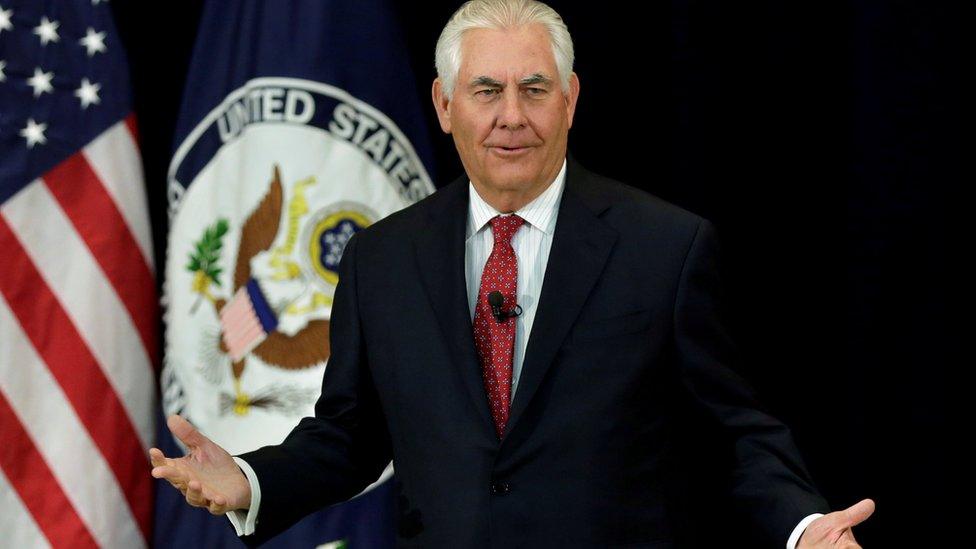Trumplomacy: What does Tillerson's speech mean?
- Published

State Department employees listen to US Secretary of State Rex Tillerson deliver an address on Wednesday
When Rex Tillerson announced a town hall meeting at the state department this week, employees were hoping their boss would "man up" and give them details about deep budget cuts that could axe 2,300 jobs.
He didn't.
Instead he spoke generally about the need to adapt institutions to a post-Cold War era, invited them to participate in a "listening exercise" about how to do so, and promised them a "much more satisfying, fulfilling career" when the pain was over.
He also gave them an unexpected tour of his thinking about how "America First" translates into foreign policy, including a breakdown of how human rights and democratic values fit into policy making in the Trump era.
Which, it seems, is not very much.
Here's the quote: "We really have to understand, in each country or each region of the world that we're dealing with, what are our national security interests, what are our economic prosperity interests, and then as we can, advocate and advance our values."
This was decried as an ominous shift in Washington's global outlook by many foreign policy observers.
Separating interests and values in US foreign policy reflects a misunderstanding of both the country's past and its national character, wrote Eliot Cohen, the state department counsellor under George W Bush, in an excoriating take down of the speech, external.
It's worth reading the full text, external because Mr Tillerson is still a bit of an unknown quantity, and this is the first comprehensive statement he's made on his strategy
To unpack the meaning of his "America First" balance between values and policies, I turned to Stephen Walt, a professor of international affairs at Harvard and a foreign policy realist.

At one level, he says, there's nothing new here: everyone understands there are trade-offs between security and economic interests on the one hand, and moral interests or democratic values, on the other - no-one better, frankly, than the experienced career diplomats in Mr Tillerson's audience.
At another level, says Mr Walt, if the Secretary of State is signalling that as a matter of policy, the US won't be putting much weight on promoting American values, there is something new here.
The past three presidents all did to some degree, whether it was supporting colour revolutions in Eastern Europe or welcoming the Arab Spring.
Mr Tillerson didn't explicitly say the US was out of that business, and he kept stressing the administration was not abandoning the values that have distinguished US foreign policy.
But it was unusual for him not to "downplay those moments of hypocrisy" inherent in governing, says Mr Walt, and instead place them right at the beginning of his speech, not "buried on page 12 and with a sense of reluctance."
Yes, traditionally it's seen as an undesirable outcome when administrations fail to achieve that difficult balance between values and broader interests. Was Mr Tillerson saying it's not necessary to try and achieve that balance at all?
More Trumplomacy:
Whatever he meant exactly - and the former ExxonMobil chief is to some degree still learning on the job - his words were interpreted through and amplified by the actions of his boss.
And so far President Trump has shown a businessman's belief that everything is up for negotiation, a transactional approach to complex matters of international relations, and an an affinity for authoritarian leaders.
Indeed, although all presidents are forced to deal with unsavoury counterparts, Mr Trump has spoken admiringly about several who exhibit decidedly un-American values.
And what of the message all of this sends?
There are two dangers in pushing this line too far, says Mr Walt: one is that it erases any distinction between the US and its adversaries.
The other is that it could encourage some governments to behave even worse, no longer fearing even rhetorical sanction from the US.